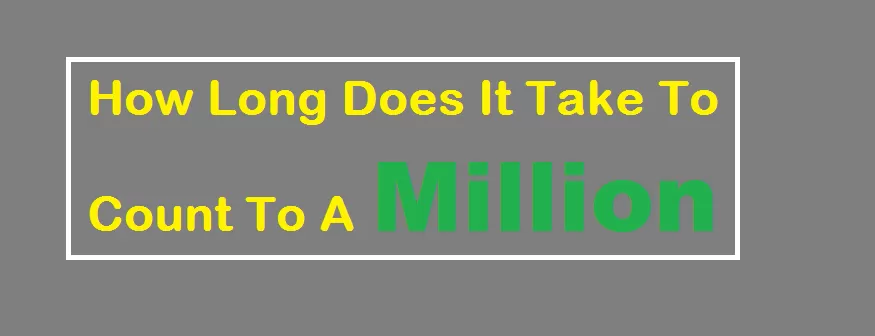How Long Does It Take To Count To A Million
Counting to a million is not easy, and it can take some time. If you were to count one number per second, it would take you approximately 11 days, 14 hours, and 46 minutes to count up to a million. However, this is assuming that you don’t take any breaks or stop counting at any point.
If you were to count out loud continuously without stopping for rest or sleep, it would take you around two weeks non-stop. It’s important to note that the average person cannot sustain that kind of focus and stamina for such extended periods.
In conclusion, counting up to a million may seem achievable, but it is more challenging than most people realize. It requires immense concentration and physical endurance; many individuals opt for automated methods like machines or computers when dealing with such large numbers.
How long does to count to a billion
Now, let’s think about counting to a billion. If it takes about 11 days to count to a million (assuming you are counting continuously for 24 hours each day), how long would it take to count to a billion? Well, simply put, it would take about 31 years!
To give some context, 1 billion seconds equals approximately 31.7 years. If you were tasked with counting every second for one billion seconds straight, it would take you just under 32 years of non-stop counting.
Of course, the human body and mind cannot handle such an immense task without rest or breaks. Therefore, realistically speaking, it may take much longer than the estimated time frame given above. Nonetheless, this gives us an idea of how big and complex numbers can be and how much time they require, even for simple tasks like counting.
How long does to count to a trillion
Now that we’ve discussed counting to a million let’s take it up a notch. How long would it take to count up to a trillion? Well, let’s do some math.
Counting from one to ten takes about 10 seconds for most people. So, counting up to one hundred would take about 100 seconds. Counting up to one thousand would take about 1000 seconds or just over 16 minutes.
If we continue this trend and count up to one million, it would take just over 11 days! But what about a trillion? Counting from one to one trillion would take approximately 31,709 years! To put that into perspective, civilization as we know it has only been around for roughly 6,000 years.
It’s safe to say that counting up to a trillion is not something anyone can realistically accomplish in their lifetime. However, there are other ways experts measure large numbers, such as scientific notation or powers of ten, which make these calculations much easier and more manageable.
How many hours does it take to count to a million?
Counting to a million is a feat that requires patience, concentration, and time. The time it takes to count to a million depends on several factors, such as the counting speed, breaks taken, and the individual’s focus level. On average, if an individual counts non-stop without taking any breaks or getting distracted by other activities, it would take approximately 11 days or 264 hours to count up to one million.
However, realistically speaking, continuous counting for such a long period can be challenging and tiring. Therefore most people who attempt this task will take several short breaks during counting sessions. In this case, the time it would take to count up to one million would depend on how long each break is.
Overall, while counting up to a million may seem like a straightforward activity at first glance, in actuality, it requires significant effort and dedication. The key takeaway from this exercise is that achieving big goals often comes down to consistency and discipline over extended periods rather than immediate results.
How many hours does it take to count to a million?
The simple answer to how long it takes to count to a million would be approximately 11 days if you were dependent non-stop for 24 hours each day. However, realistically speaking, that’s not possible. If you were to count for eight hours each day, it would take approximately 34 days or just over a month.
But what about the fact that people have different speeds when counting? Based on research from psychologist and author Daniel Levitin, who conducted an experiment where participants counted up from one to eight thousand in their native language at their normal pace and then averaged out the time taken per number, he found that, on average, it takes around two seconds per number. Based on these findings, counting up to one million would take about five years and 14 days.
Overall, while various factors such as breaks and individual counting speed can influence how long it takes to count up to a million, it’s generally safe to say that unless you’re doing this as part of some scientific experiment or challenge – it’s unlikely anyone will ever try!
FAQs
How long does it take to count to a million?
If you were counting continuously without any breaks, it would take approximately 11 days, 13 hours, and 46 minutes to count up to a million. However, this assumes you can count at a rate of one number per second without any mistakes or distractions.
Who holds the world record for counting the highest number of digits in one breath?
The Guinness World Record for counting the highest number of digits in one breath is held by Rajveer Meena from India. He counted up to 103 digits in just one breath on May 18, 2019.
Is there any scientific benefit of counting numbers?
Counting numbers have been shown to have numerous benefits for cognitive development and mathematical skills. Learning how to count helps young children develop their understanding of numbers and basic arithmetic concepts. In adults, counting exercises have been used as mindfulness meditation and have been shown to improve focus and concentration. Some studies suggest that regularly practicing mental math can help stave off age-related cognitive decline.










